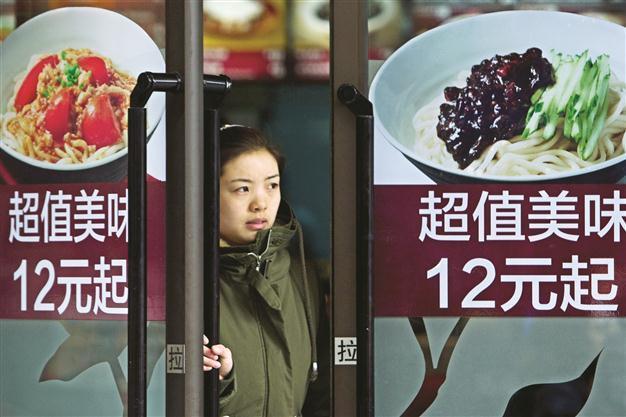China insistent on yuan policy as inflation jumps
BEIJING

An unidentified woman pushes a door open as she leaves a noodle restaurant in the capital city of Beijing, China, yesterday. China’s inflation rebounded in January. AFP photo
China will continue its currency reforms and recent yuan moves are not due to Vice President Xi Jinping’s visit to Washington, a top Chinese diplomat said yesterday.
Vice Foreign Minister Cui Tiankai said China had constantly advanced exchange rate reforms.
“As for reform of the renminbi (yuan) exchange rate formation mechanism, we have been always advancing reform for all these years, and in the future we will also resolutely and unwaveringly advance such reforms,” he told a news conference.
“But if one believed that because of a high-level visit we would make a move on the exchange rate, that would truly amount to currency manipulation,” Reuters quoted Cui as saying.
Xi, considered China’s president-in-waiting, will meet
President Barack Obama on Feb. 14. The U.S. visit will be a major step in signaling Xi’s readiness to take over as China’s next top leader.
The U.S. authorities criticize China’s monetary policy, claiming that Asia’s biggest economy is intentionally keeping its currency’s value low in a bid to support exports.
Inflation jumps
The annual inflation rate in Asia’s biggest economy hit 4.5 percent in January, the highest level in three months, data showed yesterday, after consumers splurged on food and gifts over the Lunar New Year holiday. The country’s consumer price index, a key gauge of inflation, was higher than the 4.1 percent in December and ended five straight months of easing price pressures caused by government restrictions on lending and property purchases.
Analysts told Agence France-Presse that the holiday, also known as the Spring Festival, was unusually early this year and had distorted the monthly data.
Retail spending typically soars during the week-long festival, the most important celebration in the Chinese calendar, as consumers ramp up spending on food, wine and gifts for family and friends.
Before January, inflation had eased for five months in a row after hitting a more than three-year high of 6.5 percent in July and analysts said the downward trend would likely resume in February as the economy continued to slow.
“It was inevitable that we would see some impact of the Lunar New Year holidays, which were in January this year, but February last year, but it seems that this impact was bigger than expected,” said Brian Jackson, a senior analyst at Royal Bank of Canada in Hong Kong.
US,
